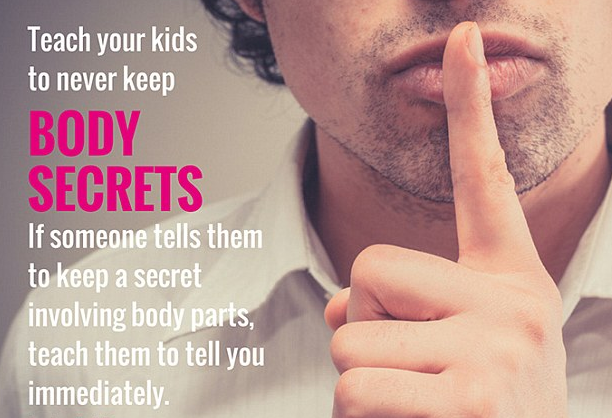This article is taken from ElephantJournal.com
Since 90 percent of child sexual abuse happens by someone our children know and trust, I thought the upcoming holiday gatherings might be a good time to discuss how we need to a) talk to our children about it and b) learn what we can do as adults to prevent it.
Here are nine tips we can use to help prevent and protect our children from sexual abuse:
1. Even young children should be able to call their body parts by their given name. If a child can name their head and shoulders, knees, and toes, they need to know how to name their genitalia.
Penis, vulva, buttocks, rectum, breasts, and nipples are uncomfortable words for parents only because of our own upbringing, religious, or cultural beliefs. Sadly, childhood trauma is often inter-generational because our parents and their parents believed these matters taboo or even sinful to discuss. Do not make the human body shameful. Make violating it shameful! And call it by its proper name.
2. We often hear parents tell their children to never keep a secret and then we ask them to keep a secret. For example, “Don’t tell Daddy what we bought him for his birthday—it’s a secret!”
Instead, tell your child it is a surprise so the “shhh” is only temporary!
3. Do not force your child to sit on Santa’s knee. The entire Santa concept is often scary for a child. Some old man who keeps himself locked away 364 days a year with a bunch of little people, who is watching our kids from afar to see whether they are naughty or nice before he sneaks in their home at night is creepy AF to me and I’m an adult.
We need to show them we respect their boundaries and that our kids’ feelings of safety are more important than a damn picture!
4. Long before gatherings, we need to talk to our children about open doors if perhaps someone wants to see their collection of whatever in their rooms. Reinforce that there is no need for doors to be closed, except the door to the house to keep it warm and, of course, when they are in the washroom (and if they have to use the washroom, they do so alone).
If a child is young enough to still require assistance with wiping, discuss in advance who they are allowed to ask for help if mommy or daddy is not available.
5. Notice any adults who pay closer attention to one child than the others. For example, if a group of cousins is playing a game and one child is downstairs with one adult watching a movie, suggest to them beforehand that they should stay in twos so no other child at the gathering feels left out.
6. Do not ask young children if they have a little boyfriend or girlfriend. We hear this ice breaker all the time and it makes me cringe. Most often, no one means any harm but it sexualizes children. Let kids be kids. Stop it.
7. If at a family gathering if we hear an adult tell a tween girl that she looks “sexy” or has “bloomed,” or we hear an adult tell a tween boy how “buff” or “hot” he got, call out the inappropriate comments.
8. Often, parents tell children to tell them if anyone tries to hurt them or touch them in a “bad” way. We need to avoid using words like good or bad because if a child thinks they did something wrong or bad, often they will get in trouble. Also, and most importantly, not all touch feels “bad” so the child may feel there is no reason to tell because it didn’t “hurt.”
9. Finally, if your child tells you someone touched them, remain calm, listen and ask questions, get an accurate account of what happened, and don’t add or omit information of your own.
Even if it was merely a hug, the child felt uncomfortable—acknowledge that and praise them for telling. Never tell the child they are mistaken or “that person would never.”
Sexual abuse perpetrators are almost always the person we least suspect and that only enables the cycle to keep on repeating itself.
